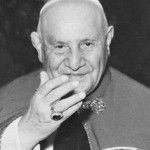- DialogikaDocuments and statementsThemes in Today's Dialogue
- News
- Members
- About
- Journal
- Meeting
October 19, 1960
VATICAN CITY
Yesterday morning,
Monday, at 11 a.m., the Holy Father received in audience, in the Throne Room, a group of about 130 people of the “United Jewish Appeal: Jewish Study Mission,” from the United States, who are taking part in a charitable trip.
This large group was led by Rabbi Herbert Friedman and Mr. Benjamin Swig.
In his respectful address, Mr. Friedman paid tribute to and greeted the revered Catholic leader, and reaffirmed the profound gratitude of Jewish communities for what the Church had done on behalf of Jews who were refugees and persecuted during the war, especially in certain nations: in this regard, he recalled in particular the providential interventions of the then-Apostolic Delegate in Turkey, Archbishop Angelo Giuseppe Roncalli, whom everyone was now happy to greet with deep respect and gratitude as the Supreme Pontiff.
In his friendly reply, the Holy Father, having thanked [Mr. Friedman] for his visit and for the gracious greetings of the distinguished group, said that he saw the event as a reaffirmation of esteem and friendship.
He recalled some extremely painful episodes from the period of his time in Istanbul, but these were not without some consolation for his priestly heart. The Pope, in fact, remembers well what he succeeded in accomplishing, especially on one occasion in which there was a risk of a terrible catastrophe. The captain of a ship, carrying thousands of children, faced the terrible risk of having to hand over his young passengers to an enemy power [i.e., a hostile government]. Instead, the steamship was diverted, and steered toward a safe harbor of refuge, due to the personal and written interventions of the Apostolic Delegate.
In gratitude to the Holy See’s representative for such a precious and charitable gesture, the Chief Rabbi of Jerusalem made a special trip to Istanbul to pay tribute to the Archbishop-Delegate, who returned the visit shortly afterward. In those conversations—as happens whenever one meets genuinely human hearts—a feeling of sweet consolation emerged: the triumph of charity, which is always possible, is revealed as the irrepressible law of life, and of human brotherhood.
As His Holiness happily recalled, the Chief Rabbi of Jerusalem wanted to accompany his thanks with a gift: a copy of the Antiquities of the Jews of Flavius Josephus, which the Holy Father has long treasured, since that volume expressed the sincerity of a feeling in full harmony with the satisfaction he felt for the work he had accomplished.
His Holiness wanted to add a few further reflections. On more than one occasion, he has recalled a moving passage of Holy Scripture: the meeting of Joseph (who had become a leading figure in the government of Egypt) with his brothers, who had come to seek him out. In the beginning, he used an innocent ruse almost to conceal himself from their sight: but then he could no longer contain what had been the yearning of his heart and, immediately after having hidden himself to conceal his sobbing, he cried out: “It is I—Joseph, your brother!”
This is a very touching page from the Old Testament. To be honest, there is a large gap between those who accept only the Old Testament and those who add the New Testament to it as well, as [their] supreme law and guidance. This distinction does not, however, impede the brotherhood that derives from our common origin, since we are all children of the same heavenly Father, and so this should always shine forth before all people, and should be put into practice through charity.
”Signatum est super nos lumen voltus tui, Domine” “You have shone the light of your face upon us, O Lord.” This brilliant truth expressed in Psalm 4 helps us to understand what true assistance and heartfelt human solidarity mean. This, indeed, will lead us onward, toward the solution of the many problems afflicting the world, uniting all people in this fundamental reality: we have come from the Father, and we must return to the Father.
While reaffirming his pleasure at their visit, His Holiness expressed his special wish for all who were present and for those who were nearest and dearest to each of their hearts.
This wish is for peace and blessing, to be extended also to their families, especially if anyone is afflicted by suffering or adversity, that they might always seek to entrust themselves into God’s hands—and thus into safekeeping, since they are the hands of a Father.
After his speech, the August Pontiff continued to chat, with loving warmth, with his visitors, repeating his hope for every good thing and light from the Lord.